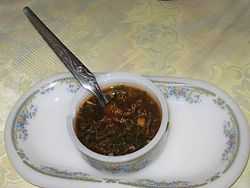Chimichurri
- Not to be confused with the Dominican dish chimichurris.

Chimichurri (Spanish pronunciation: [tʃimiˈtʃuri]) or chimmichurri is a green sauce used for grilled meat, originally from Argentina.[1][2] It is made of finely-chopped parsley, minced garlic, olive oil, oregano, and white vinegar. In Latin American countries outside of Argentina, Paraguay and Uruguay, the dominant flavoring is coriander leaf (cilantro).
Etymology
The origin of the name of the sauce is unclear.
The word chimichurri or chirriburri is attested in 1783 as a person's nickname,[3] but not connected to a sauce.
There are various stories explaining the name as a corruption of English words, most commonly the name 'Jimmy Curry'[4][5] or 'Jimmy McCurry'.[4][6] But there is no contemporary documentation of any of these stories.
The Argentine gourmet Miguel Brascó claims that the word chimichurri originated when the British were captured after the British invasions of the Río de la Plata. The prisoners asked for condiment for their food mixing English, aboriginal and Spanish words. According to this story, che-mi-curry stands for "che mi salsa" (a rough translation is hey give me condiment or give me curry). The word then corrupted to chimichurri.
Another theory for the name of the sauce comes from the Basque settlers that arrived in Argentina as early as the 19th century. According to this theory, the name of the sauce comes from the Basque term tximitxurri, loosely translated as "a mixture of several things in no particular order".[7]
Preparation
Chimichurri is made from finely chopped parsley, minced garlic, olive oil, oregano, and white or red wine vinegar. Additional flavorings such as paprika, cumin, thyme, lemon, basil, cilantro (coriander leaf) and bay leaf may be included. In its red version, tomato and red bell pepper may also be added. It can also be used as a marinade for grilled meat. Chimichurri is available bottled or dehydrated for preparation by mixing with oil and water. Variants may replace the parsley with herbs such as coriander and culantro.
See also
- Cuisine of Argentina
- Cuisine of Nicaragua
- Cuisine of Uruguay
- List of sauces
- Persillade
References
- ↑ Dictionary of Spanish: chimichurri Re-linked 2014-11-06
- ↑ Lomax Brooks, p. 82
- ↑ Caro, Francisco Xavier (1904). Viñals y Torrero, Francisco, ed. Diario de la Secretaria del Virreynato de Santa Fee, de Bogotá (Año de 1783) [Diary of the Secretary of the Viceroyalty of Santa Fee, Bogota (Year 1783)] (in Spanish). Casa de J. Ratés Martin. p. 19. Retrieved 30 November 2011.
- ↑ 4.0 4.1 Austen Weaver, Tara (2 February 2010). The Butcher and the Vegetarian: One Woman's Romp Through a World of Men, Meat, and Moral Crisis. Rodale Books. p. 41. ISBN 1-60529-996-0. Retrieved 6 December 2011.
- ↑ Dobson, Francisco Ross (5 April 2010). Fired Up: No Nonsense Barbecuing. Murdoch Books. p. 58. ISBN 1-74196-798-8. Retrieved 6 December 2011.
- ↑ Cooper, Cinnamon (18 June 2010). The Everything Cast-Iron Cookbook. Adams Media. p. 137. ISBN 1-4405-0225-0. Retrieved 6 December 2011.
- ↑ Raichlen, Steven (1 May 2010). Planet Barbecue!. Workman Publishing Company. p. 159. ISBN 0-7611-4801-9. Retrieved 6 December 2011.
Further reading
- Planet Barbecue!: 309 Recipes, 60 Countries - Steven Raichlen. p. 159.
- The Barbecue! Bible - Steven Raichlen. p. 478.
- How to Grill: The Complete Illustrated Book of Barbecue Techniques - Steven Raichlen - Google Boeken. pp. 51-53.
External links
| Look up chimichurri in Wiktionary, the free dictionary. |
| Wikimedia Commons has media related to Chimichurri. |
| ||||||
